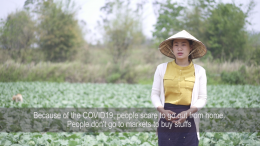Currently, vegetable farmers in Laos are not able to sell their produce because of the COVID-19 pandemic. While markets remail open, many vendors chose to close their shops and many people are also afraid to go out.
Laos farmers appeal to their Laos government to help them by purchasing their vegetables and distribute these for free to the people affected by COVID-19. The government can also extend assistance by helping the farmers build cooling facilities where they can store their vegetables so they don’t go to waste.
Bounthan Sayalath, member of the Houan Oun organic vegetable group in Xay district, Oudomxay province, Laos says that they used to sell 800 to 1,000 kilograms of vegetables per day, but nowadays, they face a serious problem because no one is buying bulk produce. Last month, their group had a meeting and decided to suspend their production until April 16. Their members depend on selling vegetables and because of the COVID-19 pandemic, their sole source of income is affected. The group appeals to the Laos government to provide them assistance with the production inputs for the next cropping season also to ensure the market so they can still sell their produce.
Aien is a fruit and vegetable trader from Laos. She used to sell baskets of bananas, potatoes, and taros at Kuadin fresh market. When the COVID-19 pandemic hit the country, she had to shut down her shop. The market remains open, but she does not have any goods to sell.
In the farms where Aien procures goods, the bananas are now ready for harvesting. But farmers are not able to sell their produce because many roads have been closed and trucks, even those carrying food produce, are not allowed to go through.
The Nongsung vegetable group in Paksong district, Champasack province, Laos sells 20 tons of cabbage daily, exporting to Thailand. This was before the COVID-19 pandemic. Now, these farmers don’t know what to do with their produce as no one is buying and they cannot sell to the local markets either. Tonnes of cabbages are on the verge of being wasted.
To avoid this from happening, the farmers are requesting assistance in looking for buyers. At this point, they just want to gain back their production cost. Secondly, they request for the government to provide them with a revolving production fund so they can recover from this crisis that hit farmers all over the world.
Khambe Oouanouansa is an online organic vegetable trader based in Vientiane capital, Laos. She acquires vegetables from Hoaphan, Xiengkhouang, and Vientiane province. Right now, Khambe faces a major problem. She already accepted orders from customers, but the produce from Hoaphan cannot be delivered because transport from Hopahan to Xiengkhouang and from Xiengkhouang to Vientiane capital is currently not allowed.
Khambe appeals to concerned government organizations in the country to help facilitate trading so they can resume their business and also to avoid wastage of vegetables from their suppliers.
In Laos, tons of vegetable production is going to waste. Many shops at fresh markets have closed after the government enforced a lockdown. Roads are also close, limiting movement and transportation. And if there is any transportation available, it costs double.
Lao farmers are appealing to the government to assist them in this time of crisis. Among their recommendations is to provide them with cooling facilities where they can store their vegetables for the time being, so they can sell them later.
Farmers from Thongmung Organic Vegetable group, in Vientiane capital, Laos, are also heavily affected by the COVID-19 pandemic. No one is buying their crops; it is difficult to travel from place to place; many agri shops in the markets are closed so there is nowhere to buy seeds and fertilizers; and the people themselves are afraid to go out for fear that they might get the virus.
However, a positive thing emerged from this situation. The government stopped importing vegetables so this will provide an opportunity for local farmers to fulfill the demands of the domestic market. All they are asking is support from the government.

Comments are closed